Unit 5 语法
(完整版)人教版英语八年级上册Unit5动词不定式语法详解
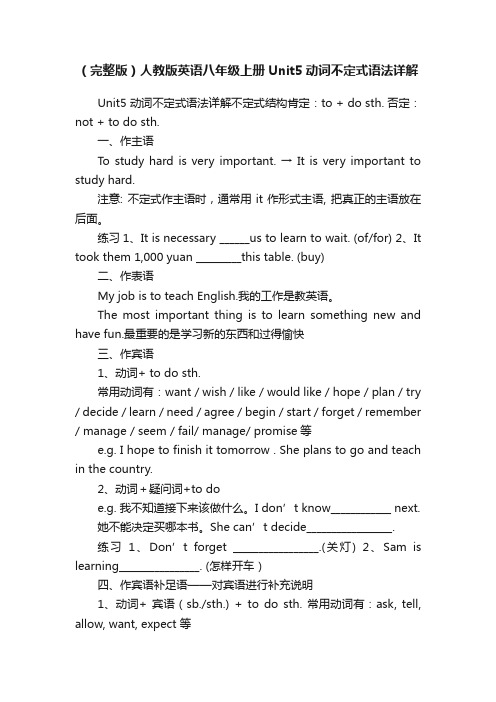
(完整版)人教版英语八年级上册Unit5动词不定式语法详解Unit5 动词不定式语法详解不定式结构肯定:to + do sth. 否定:not + to do sth.一、作主语To study hard is very important. → It is very important to study hard.注意: 不定式作主语时,通常用it作形式主语, 把真正的主语放在后面。
练习1、It is necessary ______us to learn to wait. (of/for) 2、It took them 1,000 yuan _________this table. (buy)二、作表语My job is to teach English.我的工作是教英语。
The most important thing is to learn something new and have fun.最重要的是学习新的东西和过得愉快三、作宾语1、动词+ to do sth.常用动词有:want / wish / like / would like / hope / plan / try / decide / learn / need / agree / begin / start / forget / remember / manage / seem / fail/ manage/ promise等e.g. I hope to finish it tomorrow . She plans to go and teach in the country.2、动词+疑问词+to doe.g. 我不知道接下来该做什么。
I don’t know____________ next.她不能决定买哪本书。
She can’t decide_________________.练习1、Don’t forget _________________.(关灯) 2、Sam is learning________________. (怎样开车)四、作宾语补足语——对宾语进行补充说明1、动词+ 宾语(sb./sth.) + to do sth. 常用动词有:ask, tell, allow, want, expect 等e.g. The teacher asked her to answer the question. The doctor told me to have a good rest.2、动词+宾语+不带to的不定式, 动词多为感官动词、使动词。
Unit 5 单元语法专题

【点拨】考查形容词的最高级,根据标志词of可知用最高 级形式。
考向二 不规则变化: 原级
good/well bad
many/much
far
比较级 better worse
more farther/ further
最高级 best worst
most farthest/ furthest
典例
To live a green life,we should try to save
【点拨】根据句意得知要用比较级,又因为answer是可 数名词单数,故选C。
典例 2 Of all the subjects,chemistry seems to be
____D____for me.(河北)
A.difficult
B.too difficult
C.more difficult
D.the most difficult
典例 If everyone pours less polluted water into the lake,it will be ___B_____. A.deeper and deeper B.cleaner and cleaner C.dirtier and dirtier D.wider and wider
A.can
B.may
C.must
D.need
【点拨】can表示推测,常用于否定句和疑问句中;may意 为“可能”,表示推测,但与后半句意思不符;must表示 推测,用于肯定句,意为“肯定”。由句意可知选C。
考向二 情态动词must,can,could,may,might表 示推测时,must表示的可能性程度最大,表 示“一定”。can,could,may,might都表 示“可能”,其中might表示的可能性程度最 小。可能性程度从大到小排列为 must → can→ could → may → might。
人教版初二(下)英语:unit 5语法篇(教师版)
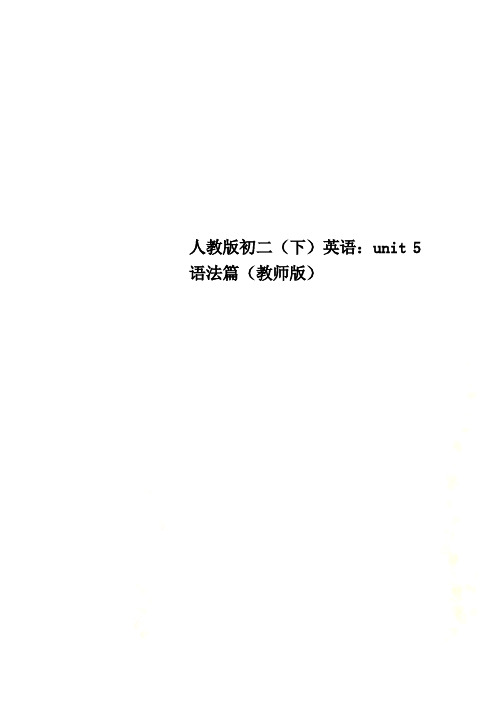
人教版初二(下)英语:unit 5语法篇(教师版)Unit 5 语法篇____________________________________________ __________________________________________________________________________________ ______________________________________学生通过本讲学习,能够掌握本单元的重点语法,并在综合能力上有一定的拓展。
when while 的区别和用法一、while的意思是“在……同时(at the same time that )”“在……期间(for as long as, during the time that)”。
从while的本身词义来看,它只能表示一段时间,不能表示具体的时间点。
在时间上可以是“线线重合”或“点线重合”,但不能表示“点点重合”。
例如:1、He was watching TV while she was cooking. 她做饭时,他在看电视。
(线线重合)2、He was waiting for me while I was working. 我工作的时候,他正等着我。
(线线重合)3、He asked me a question while I was speaking. 我在讲话时,他问了我一个问题。
(点线重合)二、when的意思是“当……时候(at the time that)”“无论什么时候(whenever)” “一……就……期间”时,其谓语通常只能是那些含有动作(action)和发展(development)意味的动词,一般不能是那些不用于进行时态的动词(如be,seem,love,want,agree,see,know,have等),所以下面一句中的while 不能换为as:A:I’m going to the post office. 我要去邮局。
仁爱版英语八年级U5T2知识点

仁爱版英语八年级U5T2知识点在仁爱版英语八年级的Unit 5中,第二个Task包含了一些重要的英语知识点。
以下是这一部分知识点的详细介绍。
1. 一般过去时一般过去时指过去某个时间做的动作或存在的状态。
构成方式为动词过去式。
例如:I studied for three hours yesterday.(我昨天学习了三个小时)They played soccer in the park last weekend.(他们上个周末在公园里踢足球)2. 时间状语时间状语用于表示动作发生的时间。
常见的时间状语有:yesterday(昨天)、last week(上个星期)、at 5 o'clock(在五点钟)、in 1999(在1999年)等。
例如:I met my old friend yesterday.(我昨天见到了我的老朋友)She didn't go to school last Monday.(她上个星期一没有去上学)3. 接替代词接替代词用于代替前面提到的名词,以避免重复。
常见的接替代词有:it(它)、them(它们)、him(他)、her(她)等。
例如:I saw a movie yesterday. It was very interesting.(我昨天看了一部电影,很有趣)Tom and Jack played basketball yesterday. Jack beat him.(汤姆和杰克昨天打篮球,杰克打败了他)4. 常用短语常用短语是指日常生活中经常使用的词组。
八年级的Unit 5T2中介绍了一些常用的短语,例如:go to the cinema(去电影院)have a great time(过得很愉快)get on well(相处融洽)be fond of(喜欢)be interested in(对…感兴趣)以上就是八年级英语Unit 5T2的知识点介绍。
通过学习这些知识点,我们能够更好地掌握英语的日常表达,提高自己的语言能力。
Unit5知识点汇总及单元语法练习人教版英语八年级上册
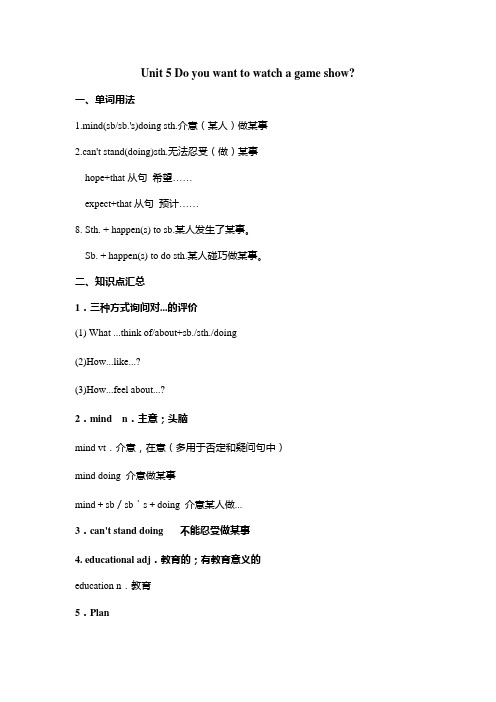
Unit 5 Do you want to watch a game show?一、单词用法1.mind(sb/sb.'s)doing sth.介意(某人)做某事2.can't stand(doing)sth.无法忍受(做)某事hope+that从句希望……expect+that从句预计……8. Sth. + happen(s) to sb.某人发生了某事。
Sb. + happen(s) to do sth.某人碰巧做某事。
二、知识点汇总1.三种方式询问对...的评价(1) What ...think of/about+sb./sth./doing(2)How...like...?(3)How...feel about...?2.mind n.主意;头脑mind vt.介意,在意(多用于否定和疑问句中)mind doing 介意做某事mind+sb/sb's+doing 介意某人做...3.can't stand doing 不能忍受做某事4. educational adj.教育的;有教育意义的education n.教育5.Planplan to do=make a plan to do 计划做某事make a plan for 为......制定计划6.news 一则消息 a piece of news7.find out“查出”,强调经过一番了解和查询,弄明白某一情况。
find“找到,发现”指偶然或意外地发现,着重指找到的结果。
8.discussiondiscussion n. have a discussion about sb/sthdiscuss v.讨论discuss sth with sb9.happen 发生、出现sth+happens/happened to sb"某人发生了某事”(常指不好的事)sb.happens/happened to do sth “某人碰巧做某事”happen 指偶然发生或突发事件的发生;take place 指按计划或事先安排的发生10.expect to do...期待/期望做什么expect sb to do 期待/期望某人做某事hope:指对愿望实现有一定信心的希望.hope to do 不能用hope sb to do11.meaningless adj.无意义的meaningful adj.有意义的meaning(s)n.意思mean(s)v.意味着,意思是12.Jenjoyable令人愉悦11Scared15.famous adj.著名的;出名的作为...而出名be famous as...因...而出名be famous for对...而言出名be famous to...16.such as 诸如...;像;比如...1 prep.超过more thanover prep. 在......的正上方over adj.完了的,结束的下课。
人教九年级英语上册课件:Unit 5 单元语法小专题(Grammar Focus)

• 一般现在时的被动语态
• 英语中的语态共有两种:主动语态和被 动语态。主动语态表示主语是动作的执 行者;被动语态表示主语是动作的承受 者。本单元的重点是一般现在时的被动 语态,其用法如下:
• 1.一般现在时的被动语态的结构是“be done”,即“am/is/are done”。
• Ⅰ.单项选择。
• (D )1.I can’t understand what the
book is about because it
in
English.
• A.writes
• B.will write
• C.will be written
• D.is written
• C( )2.The pet dog is warm and
• B.doesn’t allow
• C.didn’t allow
• D.wasn’t allowed
• C( )4.Students
not to use
mobile phones in our school now.
• A.ask
• B.asked
• C.are asked
• D.were asked
to
• 3.老板每个月都会按时给我们酬劳。 • Waere paid by the boss on time
every month.
• 4.当茶叶成熟以后,它们被手工采摘并 被送去加工。
• When the tea leaves are ready,they are
picked
and then
fobryprhoacnedssing. are sent
人教版八年级下册英语Unit5知识点总结

人教版八年级下册英语Unit5知识点总结一、语法知识点A部分知识点1.过去进行时❶ 去进行时的构成及用法过去进行时由“助动词(was/were)+动词-ing”构成,表示在过去某一时刻或某一时间段正在进行的动作。
这一特定的过去时间除有上下文暗示以外,一般用过去的时间状语来表示。
如:then, at that time, at this time yesterday, at 10:00 yesterday morning, all right以及when/while从句等。
❶ 表示过去时间点正在进行的动作。
此时常伴明确的过去时间点等。
eg:She was reading a book at this time yesterday.昨天这个时候她正在看书。
(过去时间点正在进行的动作)I was watching TV then. 那时我正在看电视。
(过去时间点正在进行的动作)❶ 表示过去的某个阶段持续的动作。
eg:She was watching TV when the phone rang.(过去一段时间内持续的动作)她正在看电视,这时电话铃响了。
❶ 表示这一阶段反复发生的动作,带有褒贬感情色彩。
此时常伴有频度副词always等。
eg:The girl was always changing her mind.(过去反复发生的动作,带有感情色彩)这个女孩老是改变主意。
❶ 表示过去动作延迟到以后发生,即用过去进行表过去将来,此类动词是一些位置的变化的词。
eg:He told me that he was going soon.(过去进行表将来)他告诉我他很快就要走了。
❶ 过去进行时的一般疑问句句型:Be(Was/Were)+主语+现在分词+其他?肯定回答:Yes,主语+be(was/were).否定回答:No,主语+be(was/were) not.eg:--Were you cooking at that time? 那时,你在做饭吗?--Yes, I were.是的。
人教版九年级全一册英语Unit5单元语法知识点总结

人教版九年级全一册英语Unit5单元语法知识点总结本单元重点短语的具体用法1. be made of:表示某物由某种材料制成,且制成后原材料仍可辨认。
例如:- This table is made of wood. 这张桌子是由木头制成的。
2. be made from:与“be made of”意思相近,但强调制成的物品已经看不出原材料。
例如:- Paper is made from wood. 纸是由木头制成的。
3. be known for:意为“因……而闻名”。
例如:- This city is known for its beautiful beaches. 这座城市以其美丽的海滩而闻名。
4. be used for:表示某物被用于某种目的。
例如:- This tool is used for cutting wood. 这个工具是用来砍木头的。
5. no matter:“不论;无论”,引导让步状语从句。
例如:- No matter what happens, I will always support you. 无论发生什么,我都会一直支持你。
6. be covered with:表示被某种东西覆盖。
例如:- The ground is covered with snow. 地面被雪覆盖了。
7. as far as I know:“据我所知”,常用在句首。
例如:- As far as I know, she is a very kind person. 据我所知,她是一个非常善良的人。
8. by hand:“用手”,强调手工制作。
例如:- These cookies were made by hand. 这些饼干是手工制作的。
9. be good for:“对……有益”,例如:- Exercising is good for your health. 锻炼对你的健康有好处。
10. on the last Friday of each month:“在每个月的最后一个星期五”,例如:- The meeting is always held on the last Friday of each month. 会议总是在每个月的最后一个星期五举行。
知识讲解和语法一点通Unit 5
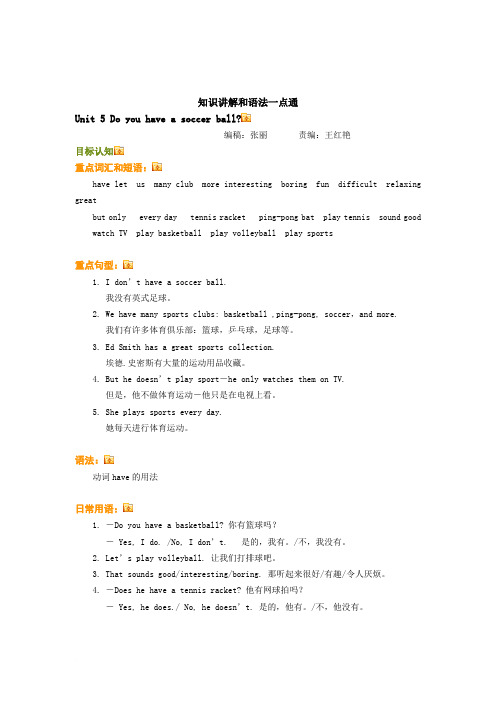
知识讲解和语法一点通Unit 5 Do you have a soccer ball?编稿:张丽责编:王红艳目标认知重点词汇和短语:have let us many club more interesting boring fun difficult relaxing greatbut only every day tennis racket ping-pong bat play tennis sound good watch TV play basketball play volleyball play sports重点句型:1. I don’t have a soccer ball.我没有英式足球。
2. We have many sports clubs: basketball ,ping-pong, soccer,and more.我们有许多体育俱乐部:篮球,乒乓球,足球等。
3. Ed Smith has a great sports collection.埃德.史密斯有大量的运动用品收藏。
4. But he doesn’t play sport-he only watches them on TV.但是,他不做体育运动-他只是在电视上看。
5. She plays sports every day.她每天进行体育运动。
语法:动词have的用法日常用语:1. -Do you have a basketball? 你有篮球吗?- Yes, I do. /No, I don’t. 是的,我有。
/不,我没有。
2. Let’s play volleyball. 让我们打排球吧。
3. That sounds good/interesting/boring. 那听起来很好/有趣/令人厌烦。
4. -Does he have a tennis racket? 他有网球拍吗?- Yes, he does./ No, he doesn’t. 是的,他有。
Unit 5 I’m watching TV重点语法及词汇讲解
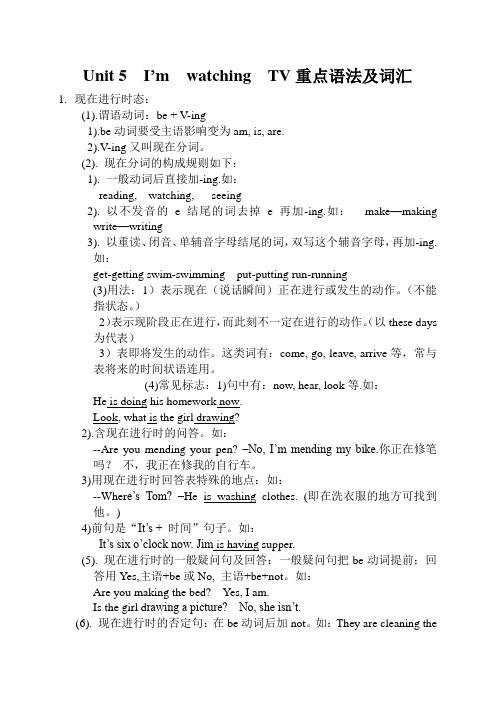
Unit 5 I’m watching TV重点语法及词汇1.现在进行时态:(1).谓语动词:be + V-ing1).be动词要受主语影响变为am, is, are.2).V-ing又叫现在分词。
(2). 现在分词的构成规则如下:1). 一般动词后直接加-ing.如:reading, watching, seeing2). 以不发音的e结尾的词去掉e再加-ing.如:make—makingwrite—writing3). 以重读、闭音、单辅音字母结尾的词,双写这个辅音字母,再加-ing.如:get-getting swim-swimming put-putting run-running(3)用法:1)表示现在(说话瞬间)正在进行或发生的动作。
(不能指状态。
)2)表示现阶段正在进行,而此刻不一定在进行的动作。
(以these days 为代表)3)表即将发生的动作。
这类词有:come, go, leave, arrive等,常与表将来的时间状语连用。
(4)常见标志:1)句中有:now, hear, look等.如:He is doing his homework now.Look, what is the girl drawing?2).含现在进行时的问答。
如:--Are you mending your pen? –No, I’m mending my bike.你正在修笔吗?不,我正在修我的自行车。
3)用现在进行时回答表特殊的地点:如:--Wher e’s Tom? –He is washing clothes. (即在洗衣服的地方可找到他。
)4)前句是“It’s + 时间”句子。
如:It’s six o’clock now. Jim is having supper.(5). 现在进行时的一般疑问句及回答:一般疑问句把be动词提前;回答用Y es,主语+be或No, 主语+be+not。
如:Are you making the bed? Y es, I am.Is the girl d rawing a picture? No, she isn’t.(6). 现在进行时的否定句:在be动词后加not。
人教版九年级英语上册Unit 5 短语、句型及语法
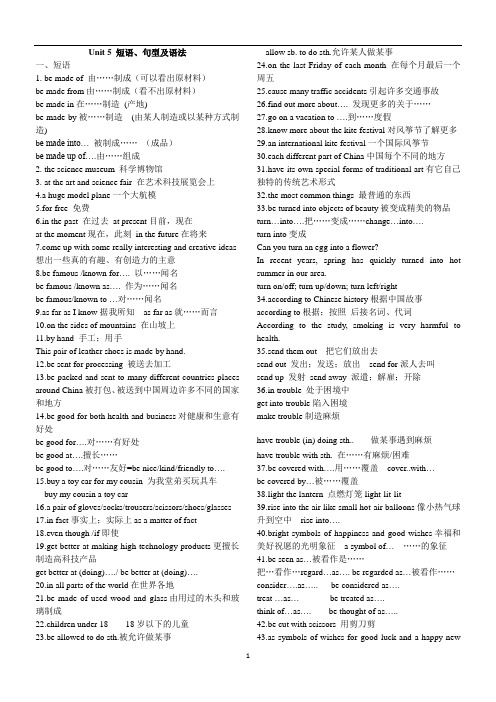
Unit 5 短语、句型及语法一、短语1. be made of 由……制成(可以看出原材料)be made from由……制成(看不出原材料)be made in在……制造(产地)be made by被……制造(由某人制造或以某种方式制造)b e made into…被制成……(成品)b e made up of….由……组成2. the science museum 科学博物馆3. at the art and science fair 在艺术科技展览会上4.a huge model plane一个大航模5.for free 免费6.in the past 在过去at present目前,现在at the moment现在,此刻in the future在将来e up with some really interesting and creative ideas 想出一些真的有趣、有创造力的主意8.be famous /known for…. 以……闻名be famous /known as…. 作为……闻名be famous/known to …对……闻名9.as far as I know据我所知as far as就……而言10.on the sides of mountains 在山坡上11.by hand 手工;用手This pair of leather shoes is made by hand.12.be sent for processing 被送去加工13.be packed and sent to many different countries places around China被打包、被送到中国周边许多不同的国家和地方14.be good for both health and business对健康和生意有好处be good for….对……有好处be good at….擅长……be good to….对……友好=be nice/kind/friendly to…. 15.buy a toy car for my cousin 为我堂弟买玩具车buy my cousin a toy car16.a pair of gloves/socks/trousers/scissors/shoes/glasses17.in fact事实上;实际上as a matter of fact18.even though /if即使19.get better at making high-technology products更擅长制造高科技产品get better at (doing)…./ be better at (doing)….20.in all parts of the world在世界各地21.be made of used wood and glass由用过的木头和玻璃制成22.children under 18 18岁以下的儿童23.be allowed to do sth.被允许做某事allow sb. to do sth.允许某人做某事24.on the last Friday of each month 在每个月最后一个周五25.cause many traffic accidents引起许多交通事故26.find out more about…. 发现更多的关于……27.go on a vacation to ….到……度假28.know more about the kite festival对风筝节了解更多29.an international kite festival一个国际风筝节30.each different part of China中国每个不同的地方31.have its own special forms of traditional art有它自己独特的传统艺术形式32.the most common things 最普通的东西33.be turned into objects of beauty被变成精美的物品turn…into….把……变成……change…into….turn into变成Can you turn an egg into a flower?In recent years, spring has quickly turned into hot summer in our area.turn on/off; turn up/down; turn left/right34.according to Chinese history根据中国故事according to根据;按照后接名词、代词According to the study, smoking is very harmful to health.35.send them out 把它们放出去send out 发出;发送;放出send for派人去叫send up 发射send away 派遣;解雇;开除36.in trouble 处于困境中get into trouble陷入困境make trouble制造麻烦have trouble (in) doing sth..做某事遇到麻烦have trouble with sth. 在……有麻烦/困难37.be covered with….用……覆盖cover..with…be covered by…被……覆盖38.light the lantern 点燃灯笼light-lit-lit39.rise into the air like small hot-air balloons像小热气球升到空中rise into….40.bright symbols of happiness and good wishes幸福和美好祝愿的光明象征 a symbol of………的象征41.be seen as…被看作是……把…看作…regard…as…. be regarded as…被看作……consider….as….. be considered as….treat …as…be treated as….think of…as…. be thought of as…..42.be cut with scissors 用剪刀剪43.as symbols of wishes for good luck and a happy new1year.作为祈求好运和新年快乐的象征44.look real 看上去逼真45. lively characters from a Chinese fairy tale or historical story来自中国童话故事或历史故事中的活灵活现的人物46.at a very high heat 以高温二、句型1.As far as I know, tea plants are grown on the sides of mountains据我所知,茶树种植在山坡上。
人教版选择性必修第一册unit5重点句式和语法讲解
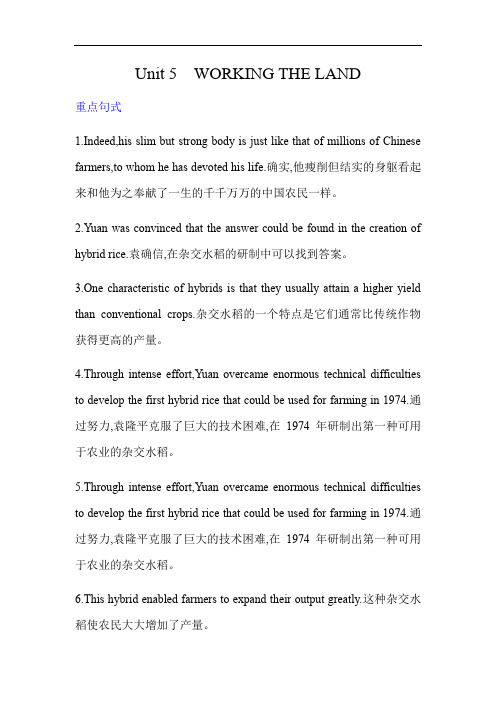
Unit 5WORKING THE LAND重点句式1.Indeed,his slim but strong body is just like that of millions of Chinese farmers,to whom he has devoted his life.确实,他瘦削但结实的身躯看起来和他为之奉献了一生的千千万万的中国农民一样。
2.Yuan was convinced that the answer could be found in the creation of hybrid rice.袁确信,在杂交水稻的研制中可以找到答案。
3.One characteristic of hybrids is that they usually attain a higher yield than conventional crops.杂交水稻的一个特点是它们通常比传统作物获得更高的产量。
4.Through intense effort,Yuan overcame enormous technical difficulties to develop the first hybrid rice that could be used for farming in 1974.通过努力,袁隆平克服了巨大的技术困难,在1974年研制出第一种可用于农业的杂交水稻。
5.Through intense effort,Yuan overcame enormous technical difficulties to develop the first hybrid rice that could be used for farming in 1974.通过努力,袁隆平克服了巨大的技术困难,在1974年研制出第一种可用于农业的杂交水稻。
6.This hybrid enabled farmers to expand their output greatly.这种杂交水稻使农民大大增加了产量。
24年新教材七年级英语上册:Unit5基础知识+语法

24年新教材| 七年级英语上册Unit5基础知识+语法Section A How do you choose a school club? 【单词】1.club n.俱乐部;社团2.join v.参加;加入3.choose v. 选择;挑选4.drama n.戏剧;戏剧表演5.feeling n.感觉;情感6.news n.消息;新闻7.musical adj.音乐的;有音乐天赋的8.exactly adv.正是如此;准确地9.drum n.鼓10.ability n.能力;才能11.paint v.用颜料画;在…上刷油漆n.油漆;涂料12.climb v.攀登;爬13.more adj.& pron.更多(的)【短语】14.play Chinese chess下中国象棋15.play musical instruments弹奏乐器16.have a try试一试【句型】17.What club do you want to join?你想参加什么社团?18.What/How about you?你呢?19.Can you play ping-pong?你会打乒乓球吗?20.I can run fast, but I can't swim.我能跑得很快,但我不会游泳。
Section B What can you learn in a school club? 【单词】1.act v. 扮演;行动n.(戏剧等)一幕;行动2.interested adj.感兴趣的3.nature n.自然界;大自然4.beef n.牛肉5.soon adv.不久;很快6.than prep.& conj.(用以引出比较的第二部分)比7.mind n.头脑;心思8.fall v.& n. 进入;掉落跌倒n.(美式)秋天9.collect v.收集;采集10.insect n.昆虫11.discover v.发现;发觉12.wildlife n.野生动物;野生生物【短语】13.act out表演14.at home在家里15.interested in..对……感兴趣16.more than多于17.fall in love with爱上……18.take photos/take a photo拍照【句型】19.Books can open your mind and make you think.书籍能开拓你的思维,使你思考。
八年级上册Unit5语法知识点

八年级上册Unit5语法知识点Unit 5是英语八年级上册学习的一个重要单元,其中语法知识点是重中之重。
本文将为大家详细讲解Unit 5中的核心语法知识点,希望对大家的学习有所帮助。
一、动词的时态动词的时态是八年级上语法中非常关键的一个知识点。
英语中动词的时态包括现在时、过去时和将来时。
现在时又包括一般现在时、现在进行时和现在完成时。
1.一般现在时一般现在时表示的是习惯性、经常性的动作或状态。
一般现在时的构成为:主语+动词原形(第三人称单数要加-s)。
例如:She often goes to the gym after work.2.现在进行时现在进行时表示的是正在进行的动作。
现在进行时的构成为:主语+be动词+动词ing。
例如:I am watching TV now.3.现在完成时现在完成时表示的是过去发生的动作对现在的影响或结果。
现在完成时的构成为:主语+have/has+过去分词。
例如:She has finished her homework.4.过去时过去时表示的是已经发生过的动作。
过去时的构成为:主语+动词过去式。
例如:We went to the park yesterday.5.将来时将来时表示的是将要发生的动作。
将来时的构成为:主语+will+动词原形。
例如:I will study hard for the test tomorrow.二、被动语态被动语态在英语语法中也是一个非常重要的知识点。
被动语态的构成为:be动词+过去分词。
被动语态的使用需要注意下面几点:1.主语是动作的承受者,谓语是做动作的人或事物。
2.一些动词不常用被动语态,如:believe、like、want、know 等。
3.有些动词本身就是不及物动词,不能使用被动语态。
例如:The book was written by him.(这本书是他写的。
)三、直接引语和间接引语直接引语是指直接引用他人的话。
例如:He said, “I’m verytired today.”间接引语则是将他人的话转述过来。
Unit;5;;Theme;parks;语法要点
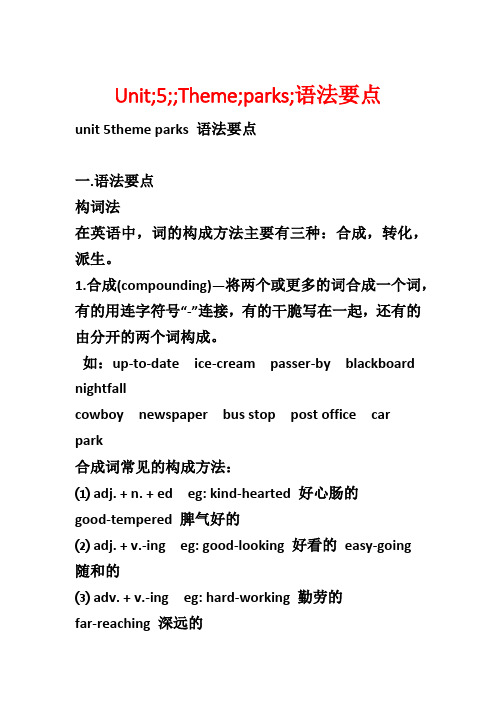
Unit;5;;Theme;parks;语法要点unit 5theme parks 语法要点一.语法要点构词法在英语中,词的构成方法主要有三种:合成,转化,派生。
1.合成(compounding)—将两个或更多的词合成一个词,有的用连字符号“-”连接,有的干脆写在一起,还有的由分开的两个词构成。
如:up-to-date ice-cream passer-by blackboard nightfallcowboy newspaper bus stop post office carpark合成词常见的构成方法:⑴ adj. + n. + ed eg: kind-hearted 好心肠的good-tempered 脾气好的⑵ adj. + v.-ing eg: good-looking 好看的easy-going随和的⑶ adv. + v.-ing eg: hard-working 勤劳的far-reaching 深远的⑷ n. + v.-ing eg: peace-loving 酷爱和平的epoch-making 划时代的⑸ n. + v.-ed eg: chinese-designed 中国设计的heartfelt由衷的⑹ adv. + v.-ed eg: widely-used广泛的well-known 闻名的⑺ adj. + n. eg: large-scale 大规模的well-known 闻名的⑻ n. + adj. eg: airsick 晕飞机的duty-free 免税的⑼基数词+ n. + adj. eg: four-year-old 四岁的ten-foot-deep 十英尺深的合成名词常见的构成方法⑴ n. + n. eg: silkworm 蚕half-moon 半月⑵ adj. + n. eg: double-dealer 两面派shorthand 速记⑶ v-ing + n. eg: waiting-room 侯车室sleeping-pill 安眠药⑷ v. + n. eg: pickpocket 扒手break-water 防洪堤⑸ n. + v.-ing eg: handwriting 书法sun-bathing 日光浴⑹ v. + adv. eg: get-together 联欢会break-through 突破⑺ adv. + v. eg: outbreak 爆发downfall 倒台合成动词常见的构成方法⑴ n. + v. eg: sleep-walk 梦游⑵ adv. + v. eg: overthrow 推翻undergo 经验⑶ adj. + v. eg: whitewash 粉刷blacklist 列入黑名单其它合成词:maybe或许myself我自己moreover 而且forever恒久2.转化〔conversion〕—由一种词性转化为另一种或几种词性。
Unit5知识点语法人教版八年级英语上册

姓名_______________ 上课时间__________________Unit 5 语法:动词不定式动词不定式作宾语1.构成基本形式:to+动词原形;有时可以不用to,to是不定式符号,本身无词义。
否定形式:not+(+to)动词原形2.句法功能:不定式可以作主语,表语,宾语,宾补,定语,状语,也就是除谓语动词之外的任何成分。
3.本单元重点是不定式宾语。
(1)只能接to do作宾语的动词:三个希望两答应:hope,wish,want,agree,promise。
两个要求莫拒绝:demand,ask,refuse。
设法学会做决定:manage,learn,decide。
不要假装做选择:pretend,choose。
还有would like,like,plan,expect等表示命令、打算或希望的。
(2)在find,think等后跟不定式作宾语时,常用it代替,而真正的宾语放在后面。
I find it easy to read English every day。
(3)常见的一些不带to的不定式:Why not do…,why don’t you do…,had better(not)do…,would rather do…,could/would/will you please(not)…。
I would rather stay at home。
(4)只能作某些动词的宾语,不能作介词的宾语。
(5)不定式常和疑问词what,which,when,where,how连用,相当于一个宾语从句。
He didn’t know where to go。
(6)有些动词后面跟动词不定式时,应将不定式符号to省去。
常见的动词有let,make,feel,help,watch,hear等感官动词和使役动词。
这是动词不定式作宾补。
一感(feel)、二听(hear,listen to)、三让(let,make,have)、四看(look at,see,watch,notice)。
Unit 5 重点单词变形,词组,语法,句型练习-2024-2025学年高二英语选择性必修第一册单元

Unit 5 Working the Land重点单词变形,词组,语法,句型练习(知识点全覆盖)单词变形1.devote vt.把……献(给);把……专用于;专心于→n.献身;忠诚;热爱2.convince vt.使相信;使确信;说服→adj.有说服力的;使人信服的→adj.确信的;坚信的3.assumption n.假定;设定;(责任的)承担;(权利的)获得→v.假定;设想→conj.假定;假设4.consumption n.消耗;消耗量;消费→vt.消耗;消费;吃;喝→n.消费者;用户;客户5.salty adj.含盐的;咸的→n.盐6.extension n.扩建部分;扩大;电话分机→vt.伸开;展开;延伸7.chemical adj.与化学有关的;化学的n.化学制品;化学品→n.化学8.nutritional adj.营养(物)的→adj.有营养的;营养丰富的→n.营养;滋养9.depth n.向下(或向里)的距离;深(度)→adj.深的→vt.加深;(使)变深重点词组1.devote...to2.be comprised of3.deep down4.in turn5.for instance一、用单词的适当形式完成句子二、根据汉语意思填写单词三、完成句子阅读下面短文,在空白处填入1个适当的单词或括号内单词的正确形式。
参考答案:单词变形1.devote vt.把……献(给);把……专用于;专心于→devotion n.献身;忠诚;热爱2.convince vt.使相信;使确信;说服→convincing adj.有说服力的;使人信服的→convinced adj.确信的;坚信的3.assumption n.假定;设定;(责任的)承担;(权利的)获得→assume v.假定;设想→assuming conj.假定;假设4.consumption n.消耗;消耗量;消费→consume vt.消耗;消费;吃;喝→consumer n.消费者;用户;客户5.salty adj.含盐的;咸的→salt n.盐6.extension n.扩建部分;扩大;电话分机→extend vt.伸开;展开;延伸7.chemical adj.与化学有关的;化学的n.化学制品;化学品→chemistry n.化学8.nutritional adj.营养(物)的→nutritious adj.有营养的;营养丰富的→nutrition n.营养;滋养9.depth n.向下(或向里)的距离;深(度)→deep adj.深的→deepen vt.加深;(使)变深重点词组1.devote...to把……用于;献身;致力;专心2.be comprised of包括;包含;由……组成(或构成)3.deep down在内心深处;本质上;实际上4.in turn相应地;转而;依次;轮流5.for instance例如;比如1.assumption【详解】考查名词。
外研选择性必修第三册Unit5_语法-精讲破
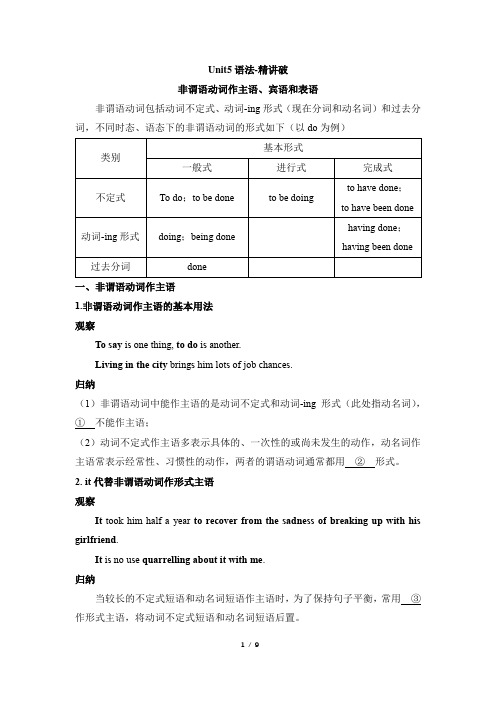
Unit5语法-精讲破非谓语动词作主语、宾语和表语非谓语动词包括动词不定式、动词-ing形式(现在分词和动名词)和过去分词,不同时态、语态下的非谓语动词的形式如下(以do为例)一、非谓语动词作主语1.非谓语动词作主语的基本用法观察To say is one thing, to do is another.Living in the city brings him lots of job chances.归纳(1)非谓语动词中能作主语的是动词不定式和动词-ing形式(此处指动名词),①不能作主语;(2)动词不定式作主语多表示具体的、一次性的或尚未发生的动作,动名词作主语常表示经常性、习惯性的动作,两者的谓语动词通常都用②形式。
2. it代替非谓语动词作形式主语观察It took him half a year to recover from the sadness of breaking up with his girlfriend.It is no use quarrelling about it with me.归纳当较长的不定式短语和动名词短语作主语时,为了保持句子平衡,常用③作形式主语,将动词不定式短语和动名词短语后置。
二、非谓语动词作宾语1.动词不定式和动词-ing形式(动名词)作宾语观察He managed to avoid an accident yesterday morning.People who are overweight may have difficulty in breathing,walking or sitting.归纳(1)动词不定式可作及物动词的宾语,常接不定式作宾语的动词有:同意提供有计划(④、⑤、⑥)要求答应想帮忙(demand、promise、want、help)准备决定要拒绝(⑦、⑧、⑨)期望选择有希望(expect、choose,hope、wish)不能负担莫假装(⑩、⑪ 、⑫ )打算设法决心坚(intend、manage determine)(2)动词-ing形式(动名词)可作及物动词或介词的宾语,常接动名词作宾语的动词(短语)有:考虑建议盼原谅(consider,suggest/advise,look forward to,excuse/pardon)承认推迟和想象(⑬ 、delay/put off fancy)避免错过继续练(⑭ 、miss,keep/keep on、⑮ )否认完成就欣赏(deny、⑯ 、⑰ )禁止想象才冒险(forbid、⑱ 、risk)不禁介意准逃亡(can’t help、⑲ 、allow/permit、⑳ )(3)接动词-ing形式(动名词)作宾语的结构有:have difficulty/trouble in doing sth.做某事有困难;spend some time,/money in doing sth.花费时间/金钱做某事;be busy in doing sth.忙于做某事。
- 1、下载文档前请自行甄别文档内容的完整性,平台不提供额外的编辑、内容补充、找答案等附加服务。
- 2、"仅部分预览"的文档,不可在线预览部分如存在完整性等问题,可反馈申请退款(可完整预览的文档不适用该条件!)。
- 3、如文档侵犯您的权益,请联系客服反馈,我们会尽快为您处理(人工客服工作时间:9:00-18:30)。
高一英语教师寄语: Time the study pain is temporary, has not learned the pain is life-long. 学习时的苦痛是暂时的,未学到的痛苦是终生的。
Unit5 Canada--- “The True North”(语法学案)—同位语从句
命题人:谭桂臻审核人: 孟坤时间:2014/3/26 编号:22
Class: _________ Name: __________ 面批时间:__________
一同位语从句的定义及引导词(A)
1.在主从复合句中做同位语的从句称为同位语从句。
一般放在fact, news, idea, truth, hope, problem, information, wish, promise, answer, explanation, suggestion
等抽象名词后面,说明该名词的具体内容,即同位语从句和所修饰的名词在内容上为同一关系,对其内容做进一步说明。
2.引导同位语从句的词
连接词:that, whether
连接代词:what, which, who等
连接副词:when, where, why, how等
二正确运用同位语从句的引导词,准备把握同位语从句
1.如果从句意义完整,应用that引导同位语从句,即that不充当任何成分,只起连接词作用,但不可省略。
2.如果从句意义不完整,需要表“是否”之意时,应用whether引导从句,但不充当成分(if不能引导同位语从句)。
3.如果从句意义不完整,需要表“什么时候,什么地点,什么方式”等之意时,且从句中缺少状语,应用when, where, how等词引导从句。
4. .如果从句意义不完整,需要表“什么,哪一个,谁”等之意时,且从句中缺主语,宾语,表语时,应用what, which, who等词引导从句。
用正确的引导词填空(B)
1).He told me the news ___________ he would come home from aboard soon.
2).There is no doubt___________ the prices of cars will go down.
3).The problem ___________ it is right hasn’t been proved.
4).The question _________ should go abroad hasn’t been decided yet.
5). I have no idea _________ one I should choose.
6).I’ve got a good idea ________ they left early.
7).The question _________ we should go has not been decided.
三关于同位语从句应该注意的几点
1.表达“是否”概念时,要用whether而不用if引导
2.当主语的谓语较短,而同位语从句较长时,从句常后置。
Word came that the Prime Minister of Japan would come to visit China next week. 四区分定语从句和同位语从句
1.都可以由名词加从句构成。
2.that引导定语从句时,称之为关系代词,在从句中充当主语或宾语,且充当动词
1
宾语时常可省略,而连接同位语从句时,不充当成分,但不可省略。
The fact that there are no lives on the moon is known to us all.()
The news that you heard is not true.()
3.当when, where, why, how引导同位语从句时,为连接副词,虽在句中充当成分,前面没有与其意义相当的先行词。
而在定语从句中他们为关系副词,其前面分别有表示时间、地点、原因及方式意义的先行词。
He will never forget the days when he lived with his grandparents.()
He has no idea when the meeting will be held.()
【当堂检测】(B)
1.Nobody believed his reason for being absent from the party ______he had to meet his uncle at the airport.
A. why
B. that
C. where
D. because
2. I couldn’t stand the terr ible noise _________she made.
A. it
B. where
C. this
D. that
3. News came _______Luo Jing passed away.
A. while
B. that
C. when
D. as
4. It is a common belief ______ a thousand miles no longer means much to us today, for modern transportation can easily get us _______this distance.
A. that; to
B. what; to
C. that; over
D. what; over
5. Word came _______the students would put off the outing until next week, when they wouldn’t be busy.
A. that
B. when
C. which
D. whether
6. The news ________the two women reporters were set free made everyone happy.
A. what
B. that
C. if
D. why
7. The father made a promise _____his daughter worked hard, he would take her to visit Huangshan.
A. if
B. that
C. whether
D. that if
8. I have no idea _________they will pass the final exam.
A. that
B. when
C. whether
D. why
9. Although most of them have no doubt ______he will win the match, I still wonder
_______he has been well prepared.
A. if; that
B. that; whether
C. that; that
D. whether; if
10. The question makes me annoyed _______he is always late for class.
A. which
B. because
C. why
D. that
11.The fact ____ she works hard is well known to us all.
A. that
B. what
C. why
D. which
12.I have no idea __ has happened to him. A. when B. that C. what D./
13. He often asked me the question ____ the work was worth doing.
A. whether
B. where
C. that
D. when
2。
